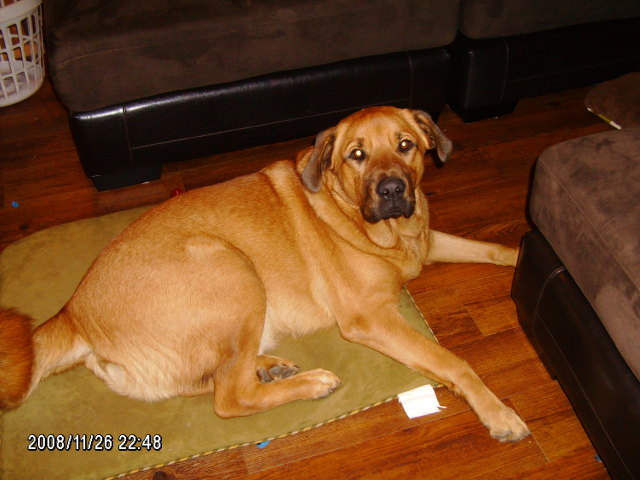Questionhello my puppy is 4 months old she is a papillion. i really havent took her to the vet yet because of my finances but she is loosing her hair it just started falling out last week.. and i just gave her the deworming medication. i was wondering if you had some answers on why she is loosing hair?
AnswerHi Summer,
Thank you for writing to me about your puppy's skin problem.
Consider that food may be the cause of our dog's skin problem.
Food allergies or sensitivities are usually the last suspect in detecting the cause of a dog's itch problems. Most dogs are fed the same type of dog food for years, so the food is rarely suspected. Dogs, like humans, can develop a sensitivity to any food or additive at any time.
It is estimated that 10 to 15 percent of all allergic skin diseases in dogs and cats is caused by food allergy.
Dog food is made up of a combination of ingredients. The most common ingredients that can cause problems in a dog include:
beef
chicken
corn
eggs
fish
lamb
milk
preservatives
pork
soy
wheat
whey
Symptoms
Skin problems are the primary symptom a dog suffers from food sensitivities.
Other symptoms may include:
anal itching
ear inflammations
hair loss
licking front paws
loss of appetite
face rubbing
head shaking
hot spots
These following symptoms may manifest but are rare:
asthma like symptoms
behavioral changes
diarrhea
flatulence
seizures
sneezing
vomiting
Steps of Prevention
Be sure to eliminate all the foods in your dog's diet that match the list above, and feed your dog a commericial or homemade diet consisting of ingredients he has never eaten before.
The homemade diet should consist of two parts starch and one part protein. Although duck, salmon, soy, venison, and rabbit are suggested for the protein; and rice and potatoes for the starch; soy and rice are not always
safe substitutes.
It is generally recommended to start with duck and potato
based foods in the beginning.
You may be able to select a special commercial dog food blend that suits your dog's needs.
Whatever diet you choose for your dog, it should be the only food he ingests during the elimination period.
This means no table scraps, dog biscuits, dog bones, rawhide chews, vitamins, minerals or chewable heartworm pills.This elimination diet is only temporary and once you find out what your dog is allergic to you can start to add other ingredients to make a complete meal for your dog.
If symptoms begin to improve during the elimination period, you can then reintroduce each of the eliminated food items one at a time. Each food should be tested for a week before another is introduced. This will allow you to pinpoint which foods may be causing problems if symptoms resurface.
Once the offensive food is discovered, then reading dog food labels should help you pinpoint a food that meets the needs of your dog. Although there are many hypoallergenic dog foods on the market, be sure to read the labels carefully. Foods like Primal & Nature's Variety (includes rabbit, buffalo, venison, lamb, sardines), Solid Gold Fish and Potato might work wonders for your dog. You can also try Spot's Stew, Avoderm, Paul Newman etc, or make your own food at home. At least that way the food is fresh and you know what has gone into it. A helpful book is Natural Health for Dogs and Cats by Dr. Pitcairn.
There is a site on dog health which includes great information about allergies and the best way to feed your dog. I urge you to spend some time studying the information that this wonderful site has to offer.
http://www.shirleys-wellness-cafe.com/animals.htm
The next most common problem is hyperadrenocorticism (Cushing's disease, HAC). This is a disorder in which high natural cortisol levels are causing hair loss and skin irritation.
If your vet is unable to resolve the problem after several visits, it might be a good idea to ask for referral to a veterinary dermatologist. Most of the time, if you work with your vet and you both are patient, skin problems can be resolved.
Some dogs develop areas of hairloss over vaccination sites or soon after being vaccinated. Many vets have been over vaccinating which can cause allergies and auto immune disease. What is the relationship between when your dog was last vaccinated and the start of his symptoms? Even if the vaccinations didn't directly cause this problem, I would refrain from vaccinating except for a three year rabies shot. Go to the following page and follow the links:
http://www.google.com/search?hl=en&ie=ISO-8859-1&q=vaccinations%2C+dogs%2C+dange...
If you wish to have a second opinion from a specialist, there are veterinary dermatologists and your vet can probably arrange to refer you to one.
Bilaterally symetric hairloss : Bilaterally symmetric
The ITCHY SKIN DISEASES are characterized by constant scratching, biting at the skin and rubbing up against objects to relieve the itch.
The next diseases are characterized by HORMONE-RELATED AND OTHER DISESES In general, hair loss caused by hormonal diseases is symmetric (the same on both sides of the body), while that caused by parasites and other causes is asymmetric.
AUTOIMMUNE and IMMUNE-MEDIATED SKIN DISEASES. All tend to progress through rubbing, biting and scratching, eventually producing skin erosions, ulcers and crusts. Look for these changes to appear first on the face, nose, muzzle and ears. During the course of grooming, playing with or handling your dog, you may discover a lump or bump on or beneath the skin.
Powerful formulas have proven their helpfulness in Vet studies, with nutrition conscious veterinarians and pet owners who have used this powerful formula for years to help strengthen the immune system, reduce pain, restore mobility and increase vitality in animals of all ages.
Canine atopy: Severe itching that occurs in young dogs and begins in late summer and fall. Caused by seasonal pollens. Occurs in mixed breeds as well as purebreds.Common.
Chiggers: Itching and severe skin irritation between toes, and around the ears and mouth. Look for barely visible red, yellow or orange chiggers.
Contact dermatitis: Red, itchy bumps and inflamed skin at the site of contact with chemical, detergent, paint or other irritant. Affects feet and hairless parts of the body.
Damp hay itch (Pelodera): Red pimplelike bumps on skin. Severe itching. Occurs in dogs bedded on damp hay and similar grass.
Fly-bite dermatitis: Painful bites at tips of erect ears and bent surfaces of floppy ears.
Rejuva Spray
Azmira's Rejuva Spray is an excellent topical spray for skin eruptions, hot spots, prickly heat, pimples, scrapes, and burns. Reduces inflammation, promotes healing and has anti-bacterial properties to help prevent the spread of infection. Rejuva Spray contains Fresh, Organic Extracts of Witch Hazel, Calendula, Yucca, Golden Seal Root and Grapefruit.
If the underlying cause is allergies, begin an aggressive campaign to rid your home and yard of fleas and work with your veterinarian on a plan to reduce allergy triggers for your pet. Household dust, plant pollen, lawn chemicals, and diet can all cause allergies or can build to a crescendo of allergies if the dog's sensitivities cross a threshhold. Frequent vacuuming, supplements to keep the skin and coat healthy, air purifiers, and baths in skin-soothing herbal or medicated shampoos with aloe, oatmeal, jojoba, or eucalyptus can help.
I am not aware of what you've been feeding him but my recommendation in general would be to move to a human grade food that is as pure as possible.
Cook up a bit of boiled egg, chicken, fish, turkey (although your dog may have an allergy to chicken/turkey so lean toward the egg and fish for awhile). You might also consider venison, rabbit,canned salmon, mackarel,sardines etc. You would have to find these at a speciality shop or on line. Add in some yogurt (live culture), canned plain pumpkin or cook up some squash or sweet potato(not white). Move to this new diet slowly.
Nutrients to add to the mix: Missing Link and Prozyme (J&B Wholesale Pet Supplies), Probiotics (B-Naturals), lots and lots of fish oil but build up slowly, Green Powder, Vit C powder, a fish oil/olive oil rotation and mix well. You can add lightly steamed veggies such as carrots, zuccini, broccoli etc (make a mash out of them) and some apple (no grapes or raisins).
I would stay away from commercial medicated (and toxic) shampoos. Stick to more natural oatmeal baths and products that contain tea tree oil but be sure to rinse thoroughly as tea tree should not be ingested by a dog.
Have a complete thyroid panel done and don't accept a high or low normal reading, as normal. If it is not right in the middle, then ask for medication to bring it there.
You might want to do some detective work around your house and grounds. Dogs, especially small ones who are low to the ground, are especially sensitive to cleaning agents and outgassing from carpets and lawn care products. I prefer cleaining with vinegar and Dr. Bronner's. It's natural and works really well. It's better for you and your family too!
Vaccinations may cause skin problems:
Dr. Jean Dodds protocol is now being adopted by ALL 27 North American veterinary schools. I highly recommend that you read this. Copy and save it to your files. Print it and pass it out at dog fairs, cat shows, kennel club meetings, dog parks, give a copy to your veterinarian and
groomer, etc., etc. Get the word out. ~~~~
Vaccination NEWSFLASH
I would like to make you aware that all 27 veterinary schools in North America are in the process of changing their protocols for vaccinating dogs and cats. Some of this information will present an ethical & economic challenge to vets, and there will be skeptics.
Some organizations have come up with a political compromise suggesting vaccinations every 3 years to appease those who fear loss of income vs. those concerned about potential side effects.Politics, traditions, or the doctor's economic well being should not be a factor in medical decision.
NEW PRINCIPLES OF IMMUNOLOGY
"Dogs and cats immune systems mature fully at 6 months. If a modified live virus vaccine is given after 6 months of age, it produces an immunity which is good for the life of the pet (ie: canine distemper, parvo, feline distemper). If another MLV vaccine is given a year later, the antibodies from the first vaccine neutralize the
antigens of the second vaccine and there is little or no effect. The titer is not "boosted" nor are more memory cells induced." Not only are annual boosters for parvo and distemper unnecessary, they subject the pet to potential risks of allergic reactions and immune-mediated
hemolytic anemia. "There is no scientific documentation to back up label claims for annual
administration of MLV vaccines." Puppies receive antibodies through their mothers milk. This natural protection can last 8-14 weeks.
Puppies & kittens should NOT be vaccinated at LESS than 8 weeks. Maternal immunity will neutralize the vaccine and little protection (0-38%) will be produced. Vaccination at 6 weeks will, however, delay the timing of the first highly effective vaccine. Vaccinations given 2 weeks apart suppress rather than stimulate the immune system. A series of vaccinations is given starting at 8 weeks and given 3-4 weeks apart up to 16 weeks of age. Another vaccination given sometime after 6 months of age (usually at 1 year 4 mo) will provide lifetime immunity.
CURRENT RECOMMENDATIONS FOR DOGS
Distemper & Parvo
"According to Dr. Schultz, AVMA, 8-15-95, when a vaccinations series given at 2, 3 & 4 months and again at 1 year with a MLV, puppies and kitten program memory cells that survive for life, providing lifelong immunity." Dr. Carmichael at Cornell and Dr. Schultz have studies showing immunity against challenge at 2-10 years for canine
distemper & 4 years for parvovirus. Studies for longer duration are pending. "There are no new strains of parvovirus as one mfg. would like to suggest. Parvovirus vaccination provides cross immunity for all
types." Hepatitis (Adenovirus) is one of the agents known to be a cause of kennel cough. Only vaccines with CAV-2 should be used as CAV-1 vaccines carry the risk of "hepatitis blue-eye" reactions & kidney damage.
Bordetella Parainfluenza: Commonly called "Kennel cough"
Recommended only for those dogs boarded, groomed, taken to
dog shows, or for any reason housed where exposed to a lot of dogs. The intranasal vaccine provides more complete and more rapid onset of immunity with less chance of reaction. Immunity requires 72 hours and does not protect from every cause of kennel cough. Immunity is of short duration (4 to 6 months).
RABIES
There have been no reported cases of rabid dogs or cats in
Harris, Montogomery or Ft. Bend Counties [Texas], there have been rabid skunks and bats so the potential exists. It is a killed vaccine and must be given every year.
Lyme disease is a tick born disease which can cause lameness, kidney failure and heart disease in dogs. Ticks can also transmit the disease to humans. The original Ft. Dodge killed bacteria has proven to be the most effective vaccine. Lyme disease prevention should emphasize
early removal of ticks. Amitraz collars are more effective than Top Spot, as amitraz paralyzes the tick's mouth parts preventing transmission of disease .
VACCINATIONS NOT RECOMMENDED
Multiple components in vaccines compete with each other for the immune system and result in lesser immunity for each individual disease as well as increasing the risk of a reaction.Canine Corona Virus is only a disease of puppies. It is rare, self limiting (dogs get well in 3 days without treatment). Cornell &Texas A&M have only diagnosed one case each in the last 7 years. Corona
virus does not cause disease in adult dogs.
Leptospirosis vaccine is a common cause of adverse reactions in dogs . Most of the clinical cases of lepto reported in dogs in the US are caused by serovaars (or types) grippotyphosa and bratsilvia.
The vaccines contain different serovaars eanicola and ictohemorrhagica. Cross protection is not provided and protection is short lived. Lepto vaccine is immuno-supressive to puppies less than 16 weeks.
THE VIEW FROM THE TRENCHES; BUSINESS ASPECTS
Most vets recommend annual boosters and most kennel operators require them. For years the pricing structure of vets has misled clients into thinking that the inherent value of an annual office visit was in the "shots" they failed to emphasize the importance of a physical exam
for early detection of treatable diseases. It is my hope that you will continue to require rabies & Kennel cough and emphasize the importance of a recent vet exam. I also hope you will accept the new protocols and honor these pets as currently vaccinated. Those in the boarding business
who will honor the newvaccine protocols can gain new customers who were turned away from vet owned boarding facilities reluctant to change.
Dogs & cats no longer need to be vaccinated against
distemper, parvo, & feline leukemia every year . Once the initial series of puppy or kitten vaccinations and first annual vaccinations are completed, immunity from MLV vaccines persists for life. It has been shown that cats over 1 year of age are immune to Feline Leukemia whether they have been vaccinated or not. Imagine the money you will save, not to mention fewer risks from side effects. PCR rabies vaccine, because it is not adjuvanted, will mean less risk of mediated hemolytic anemia and allergic reactions are reduced by less frequent use of vaccines as well as by avoiding unnecessary vaccines such as K-9 Corona virus and chlamydia for cats, as well as ineffective vaccines such as Leptospirosis and FIP. Intranasal vaccine for Rhiotracheitis and Calici virus, two upper respiratory viruses of cats provide more complete protection than injectable vaccines with less risk of serious reactions.
The AAHA and all 27 veterinary schools of North America are
our biggest endorsement for these new protocols.
Please consider as current on all vaccinations for boarding purposes .
DOGS Initial series of puppy vaccines
1. distemper, hepatitis, parvo, parinfluenze - 3 sets one month apart concluding at 16 weeks of age.
2. Rabies at 16 weeks of age (later is better)
3. Bordetella within last 4-6 months
First annual (usually at 1 year and 4 months of age)
1. DHP, Parvo, Rabies
2 years or older
1. Rabies with in last year
2. DHP & Parvo given anytime over 6 months of age , but not necessarily within the last year.
Recommended: Physical exam for transmissible diseases and health risks.
Finally, you might consider having a consultation with Dr. Kruesi.
http://www.crvetcenter.com/drkruesi.htm/
He is located in Vermont but does phone consultations. I think that he is one of the best vets in the country. My dog was scratching herself bloody from allergies and she now has the softest, healthiest fur imaginable in just after a month on Dr. Kruesi's protocol.
I wish you the best of luck in getting your dog's health back to normal. I do think that Dr. Kruesi may be able to help you out of this situation.
Please keep me posted.
Best Regards,
Shelley Davis

 Training....
Question
Me with brady
My dog Brady is a year old, he i
Training....
Question
Me with brady
My dog Brady is a year old, he i
 mouthing; pawing, wont drop it
Question
My puppy Trigger
I have a 10 month old LARGE (
mouthing; pawing, wont drop it
Question
My puppy Trigger
I have a 10 month old LARGE (
 Agression towards kids
Question
Holly Daze
I have a 2.5yo Silky Terrier. She i
Agression towards kids
Question
Holly Daze
I have a 2.5yo Silky Terrier. She i
 mini-schnauzer limping not able to put full weight on leg
Question
Willy
A couple of hours ago, I walked my 14mon
mini-schnauzer limping not able to put full weight on leg
Question
Willy
A couple of hours ago, I walked my 14mon
 Rescued Shiba with ISSUES
Question
Shredder
Kristin,
I consider myself an experie
Rescued Shiba with ISSUES
Question
Shredder
Kristin,
I consider myself an experie